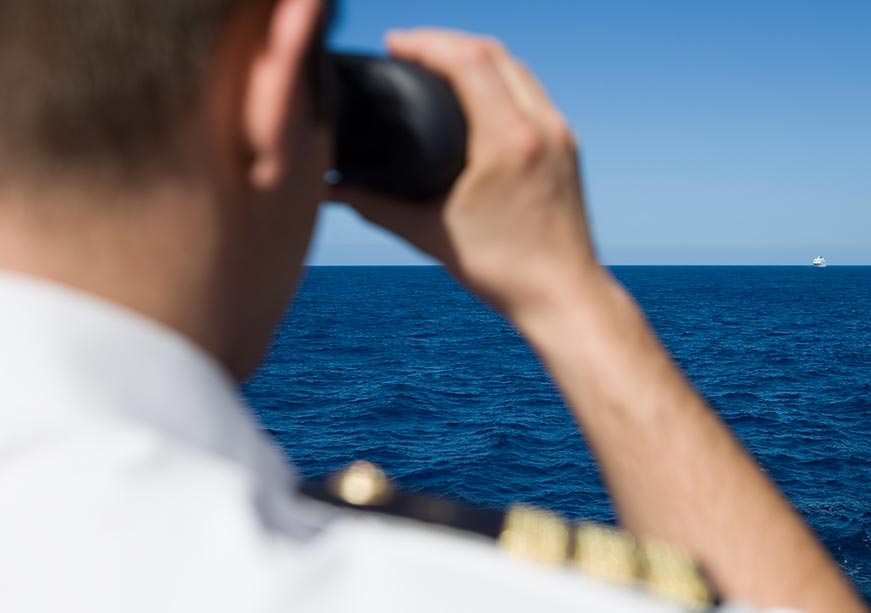-
CENTRES
Progammes & Centres
Location
With the rise in the Indian Ocean’s geopolitical importance, maritime domain awareness has become a crucial facet of India’s security and cooperation in the region

Image Source: Getty
Established in 2018 and hosted by the Indian Navy, the Information Fusion Centre – Indian Ocean Region (IFC-IOR) has emerged as a critical facet of India’s maritime safety and security efforts in the Indian Ocean. Given the growing priority accorded to maritime domain awareness (MDI) in maritime security preparedness, the IFC-IOR continues to facilitate information exchange and dissemination related to imminent challenges at sea. The establishment of the centre has marked an increment in India’s maritime security preparedness and maritime cooperation.
India’s maritime geography makes maritime security a key priority in its broader national security thinking. Given the complex challenges at sea, vigilance in the maritime domain is crucial to safeguard India’s vital maritime interests. With the growing proliferation of non-traditional maritime security challenges in the Indian Ocean, such as maritime terrorism, piracy, trafficking, and IUU (Illegal, Unreported and Unregulated) fishing among others, maritime domain awareness has emerged as a critical cornerstone of maritime security preparedness. Coupled with the emergence of new technologies, real-time data has provided scope for cooperation between agencies and organisations for the monitoring of oceans to ensure safety and security. In tandem with India’s SAGAR (Security and Growth for All in the Region) vision, information dissemination has also emerged as a crucial component in the enhancement of cooperation in maritime security.
Given the complex challenges at sea, vigilance in the maritime domain is crucial to safeguard India’s vital maritime interests.
In this light, the IFC-IOR has emerged as an important facet of India’s continued efforts to enhance maritime security preparedness. Importantly, given the vast geography of the Indian Ocean and the capacity differential among regional states, cooperation through information sharing has provided a vital ground of convergence for India and its partners. India announced the establishment of the IFC-IOR at the Indian Ocean Rim Association (IORA) leaders’ summit, Jakarta, in 2017 to coordinate and cooperate on maritime domain awareness. This prompts the question—why is maritime domain awareness important? Oceans are vast and complex spaces with dynamic challenges that hold the potential to profoundly impact a nation’s national security. Thus, it is imperative to grasp the evolving dynamics of the oceans. This awareness is likely to shape responses to challenges emanating from the oceans.
For maritime nations, this is crucial since it poses an alarming threat to security—not only traditional maritime security but also environmental security, economic security, human security, and food security. In the Indian Ocean, maritime domain awareness has gained currency following the rise in its geopolitical importance. While the region was characterised by the onset of strategic inertia in the post-Cold War period, with the rise of new economic players and the growing importance of the Sea Lines of Communication (SLOCs) in the region, the security and stability in the Indian Ocean has increasingly emerged as a key priority for its stakeholders. In this context, information sharing through maritime domain awareness has emerged as a critical aspect of the regional maritime security agenda. This aligns well with India’s outlook towards the region. MDA in the Indian Ocean is important for India not only to secure its own maritime interests but also to work towards its stated goal of facilitating regional security preparedness.
The imminent threats arising in the oceans have the potential to directly impinge on the national security of regional littoral states, as well as endanger the lives and livelihood of coastal populations in these countries.
The IFC-IOR has marked steady progress in facilitating cooperation in maritime domain awareness efforts. For example, when it was first established, IFC-IOR shared information with partners virtually. Now, there are International Liaison Officers from 12 partner countries through which dissemination of information is facilitated. Importantly, another major development towards bolstering cooperation in MDA is its incorporation into multilateral and minilateral groupings. Given that maritime domain awareness has risen as a critical agenda for maritime safety and security and given the capacity differential among the Indian Ocean littoral states, countries like India have sought to play an important role in enabling cooperation for sea vigilance and information sharing. The Indian Ocean Rim Association—the only pan-Indian Ocean regional forum—seeks to bolster efforts towards maritime security in the region. The imminent threats arising in the oceans have the potential to directly impinge on the national security of regional littoral states, as well as endanger the lives and livelihood of coastal populations in these countries. Therefore, for a regional organisation seeking to strengthen efforts for maritime security preparedness, MDA is naturally a key priority. This is in alignment with India’s SAGAR vision and efforts to bolster cooperation on maritime domain awareness. Furthermore, maritime domain awareness has emerged as an important facet of the Quadrilateral Security Dialogue—a grouping of Australia, India, Japan, and the United States—cooperation to strengthen maritime security preparedness in the Indo-Pacific. The recent Quad leaders’ summit at Wilmington in September 2024 announced the scaling up of the Indo-Pacific Partnership for Maritime Domain Awareness to build synergies with IFC-IOR. In this regard, India’s role in the Indian Ocean remains critical. Importantly, India’s location in the region at the heart of the Indian Ocean makes it imperative for India to lead MDA efforts in the region. Cooperation among forums such as IFC-IOR and its counterparts in like-minded countries is crucial to effectively monitor the oceans and share information to strengthen maritime security.
Bolstering maritime domain awareness is critical to monitoring Chinese advances in the region and enhancing maritime security preparedness accordingly.
Going forward, the dynamic maritime challenges emerging are likely to galvanise the urgency for information sharing in maritime security. For India’s own maritime security interests in the Indian Ocean, it is vital to monitor China’s growing forays into the region. Unlike the South China Sea, the Indian Ocean has not witnessed Chinese naval aggression. Instead, China has adopted a strategy of sending research and survey vessels into the Indian Ocean, which have occasionally docked at critical nodes in the regional landscape, such as Sri Lanka and Maldives. This has prompted a security dilemma in India, given that New Delhi remains concerned about Chinese presence in the Indian Ocean. Bolstering maritime domain awareness is critical to monitoring Chinese advances in the region and enhancing maritime security preparedness accordingly. At a collective level, the rising threats of piracy, maritime terrorism, and IUU fishing have exacerbated the urgent need for a collective approach to strengthen the maritime security environment of the Indian Ocean. In tandem with India’s stated objective of leading efforts in maritime security preparedness in the Indian Ocean, MDA through IFC-IOR is likely to gain further momentum.
Sayantan Haldar is a Research Assistant with the Strategic Studies Programme at the Observer Research Foundation
The views expressed above belong to the author(s). ORF research and analyses now available on Telegram! Click here to access our curated content — blogs, longforms and interviews.

Sayantan Haldar is a Research Assistant at ORF’s Strategic Studies Programme. At ORF, Sayantan’s research focuses on Maritime Studies. He is interested in questions of ...
Read More +